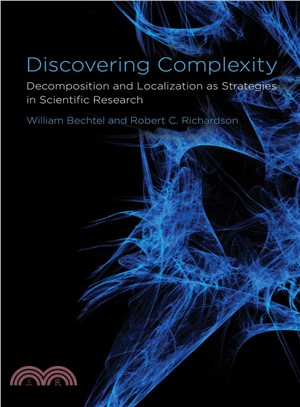Discovering Complexity ─ Decomposition and Localization as Strategies in Scientific Research
- ISBN13:9780262514736
- 出版社:Mit Pr
- 作者:William Bechtel; Robert C. Richardson
- 裝訂/頁數:平裝/340頁
- 規格:22.9cm*15.2cm*2.5cm (高/寬/厚)
- 出版日:2010/08/06
商品簡介
When Discovering Complexity was originally published in 1993, few philosophers of science perceived the centrality of seeking mechanisms to explain phenomena in biology, relying instead on the model of nomological explanation advanced by the logical positivists (a model Bechtel and Richardson found to be utterly inapplicable to the examples from the life sciences in their study). Since then, mechanism and mechanistic explanation have become widely discussed. In a substantive new introduction to this MIT Press edition of their book. Bechtel and Richardson examine both philosophical and scientific developments in research on mechanistic models since 1993.
William Bechtel is Professor of Philosophy at the University of California, San Diego. He is the author of Mental Mechanisms: Philosophical Perspectives on Cognitive Neuroscience and other books. Robert C. Richardson is Charles Phelps Taft Professor of Philosophy and University Distinguished Research Professor at the University of Cincinnati. He is the author of Evolutionary Psychology as Maladapted Psychology (MIT Press, 2007). Both are Fellows of the American Association for the Advancement of Science.
"The first edition of Discovering Complexity pioneered what has come to be called `the new mechanistic philosophy,' with original analyses of mechanistic explanation and the heuristics for discovering mechanisms in genetics, cell biology, and neuroscience. Having it back in print is a real service to philosophers and scientists investigating biological mechanisms, as well as critics of this approach. The new introduction is well worth reading on its own for an overview of the book's arguments, as well as summaries of the authors' more recent work on dynamic mechanistic explanations, discovery heuristics, emergence in systems biology, and circadian rhythms."---Lindley Darden, University of Maryland, College Park
"The original edition of Discovering Complexity was a landmark in the philosophy of science, with path-breaking accounts of explanation, mechanism, and the development of biological knowledge. This reissue is highly welcome, especially with the excellent new introduction that contains insightful updates about mechanisms, discovery, localization, emergence, and other crucial aspects of science."---Paul Thagard, University of Waterloo, author of The Brain and the Meaning of Life
"In Discovering Complexity, Bechtel and Richardson sketched a blueprint for a post-reductive philosophy of science grounded in historical examples and focused on major heuristics and biases in the search for mechanisms. Many of the ideas in this book are as fresh today as they were when the book was first published: others have become the widely accepted background in the new mechanistic philosophy of science."---Carl F. Craver, Washington University in St. Louis, author of Explaining the Brain
"This classic of mechanistic analysis and explanation has been out of print for some years. It is reissued with a substantive new review of the explosion of interest in mechanistic explanation in philosophy of science and the crucial interpenetration of scientific and philosophical interests it represents. I welcome its return in even better form. MIT has done the profession a major service by reissuing this book. It should be required reading in any philosophy of science curriculum."---William C. Wimsatt, Peter M. Ritzma Professor of Philosophy. the University of Chicago
作者簡介
William Bechtel is Professor of Philosophy at the University of California, San Diego. He is the author of Mental Mechanisms: Philosophical Perspectives on Cognitive Neuroscience and other books. Robert C. Richardson is Charles Phelps Taft Professor of Philosophy and a University Distinguished Research Professor at the University of Cincinnati. He is the author of Evolutionary Psychology as Maladapted Psychology (MIT Press, 2007). Both are Fellows of the American Association for the Advancement of Science.
主題書展
更多主題書展
更多書展本週66折
您曾經瀏覽過的商品
購物須知
外文書商品之書封,為出版社提供之樣本。實際出貨商品,以出版社所提供之現有版本為主。部份書籍,因出版社供應狀況特殊,匯率將依實際狀況做調整。
無庫存之商品,在您完成訂單程序之後,將以空運的方式為你下單調貨。為了縮短等待的時間,建議您將外文書與其他商品分開下單,以獲得最快的取貨速度,平均調貨時間為1~2個月。
為了保護您的權益,「三民網路書店」提供會員七日商品鑑賞期(收到商品為起始日)。
若要辦理退貨,請在商品鑑賞期內寄回,且商品必須是全新狀態與完整包裝(商品、附件、發票、隨貨贈品等)否則恕不接受退貨。

























